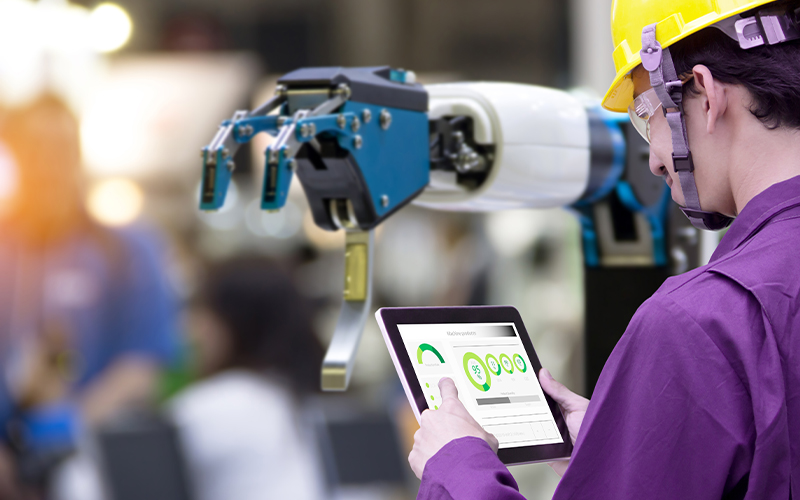Robotic Process Automation
Transforming business processes with Robotic Process Automation (RPA) for Business
As more and more CIOs turn towards business transformation tools and technologies and adopt novel strategies to drive a greater degree of automation, robotic process automation (RPA) is taking centre stage in this revolution.
From banks and insurance firms to retail chains and supply chain processes, virtually every thriving business sector is looking to embrace some form of automation.
A leading global research and advisory firm predicted that 85% of large companies will have deployed some form of RPA by 2022.
Here’s looking at how RPA (as-a-service) can streamline operations within organizations and is transforming various business processes across industries and what lies in the near future for enterprises looking to level up.
For organisations on the digital transformation journey, agility is key in responding to a rapidly changing technology and business landscape. Now more than ever, it is crucial to deliver and exceed on organisational expectations with a robust digital mindset backed by innovation. Enabling businesses to sense, learn, respond, and evolve like a living organism, will be imperative for business excellence going forward. A comprehensive, yet modular suite of automation software services is doing exactly that. Equipping organisations with intuitive decision-making automatically at scale, actionable insights based on real-time solutions, anytime/anywhere experience, and in-depth data visibility across functions leading to hyper-productivity, Live Enterprise is building connected organisations that are innovating collaboratively for the future.
How Robotic Process Automation (RPA) helps business?
Come to think of it - the concept of automation and its meaning is self-explanatory. It is meant to eliminate tedious and repetitive tasks, enabling the corporate workforce to focus on more important aspects of the business while utilizing RPA programs.
The various business benefits of RPA include:
- Reduced staffing costs
- No scope for human errors and increased volume-handling capacity
- Increased capacity to handle more volumes of work
- Improved customer service and CX
- Higher productivity and ROI
Enabling RPA service can free up valuable staff time and allow the implemented systems to take care of your mundane, repetitive, and manually-intensive tasks. This means you can utilise your workforce to contribute to higher-value business areas that equire manual intervention and decision-making.
RPA ensures that the rate of errors goes down substantially since pre-programmed software robots replace humans who are more prone to making mistakes while entering data. RPA can effectively handle tasks like data entry, error reconciliation, and rule-based decision-making.
Given that you will have RPA bots toiling away efficiently, you can scale up when demand increases and manage more workloads with business process automation in place.
RPA helps businesses take a customer-centric approach by enabling AI- and ML-powered customer service chatbots and tech support to answer common queries, thus delivering a remarkable customer experience.
By automating various tasks across processes, RPA helps enterprises become more productive and gain higher returns on their investments in technology and people through automation tools.
These benefits of RPA span across various use cases such as:
- Customer service
- Invoice processing
- Payroll processing
- Credit card applications
- Sales order entries
How can enterprises capitalise on the potential of RPA?
RPA requires a well-thought-out design, fool-proof planning, and solid governance to work beneficially for your business. Through intelligent automation efforts, modern businesses can reap greater rewards by supporting RPA with other smart technologies such as AI, ML, NLP, and speech recognition, particularly through the integration of RPA software. One must, however, not confuse RPA with artificial intelligence (AI). The subtle but main difference is that RPA requires human intervention and only automates tasks with structured input, unlike other automation tools that may handle unstructured data. Whereas AI is given the ability to think, understand, and interpret unstructured data and therefore goes a step ahead in functioning independently.
How to implement RPA?
While the concept sounds great in theory, not all businesses have successfully managed to tap into the full potential of RPA. And, that is mainly because they have failed at either selecting an RPA tool as per their requirement or failed at choosing the right vendor who can help implement the solution.
Here’s how you can make sure you don’t slip and fall into that abyss:
- Increase your knowledge of RPA and its strategies that would benefit your business
- Upskill your employees to improve their capabilities
- Estimate which processes can and cannot be automated
- Analyse which RPA tools and solutions can be deployed
- Choose the right RPA partner
How can Infosys BPM help RPA for business?
With intelligent process automation - an ideal blend of RPA and AI - Infosys BPM delivers a solution that ensures a zero-touch process and innovative service design, improving efficiency, amplifying business value, and enhancing customer experience.
Integrate RPA technology and develop intelligent processes while achieving unprecedented agility, reduced effort, and increased productivity with our robotic process automation solutions.







